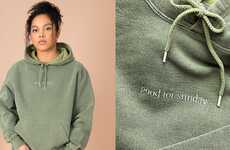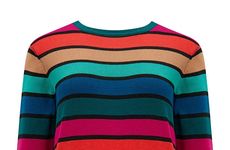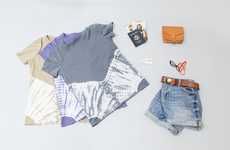
Good & Fair Clothing Uses Organic Materials and Pays Equitable Wages
Sarah Moore — July 17, 2012 — Social Good
References: goodandfairclothing
Frustrated about the lack of socially responsible clothing available on the market, Shelton Green founded Good & Fair Clothing to provide consumers with the option of purchasing garments made from fairly traded and organic materials.
The line creates all of its tee shirts, ladies underwear and men's boxer briefs using a visible supply chain dedicated to transparency in the manufacturing process and ensuring that workers are paid a fair wage for their labor.
All of their cotton is certified to be 100 per cent organic and they operate using environmentally conscious manufacturing processes. The company also works in association with Fair Trade USA to ensure that every step in the production of their clothing is ethical and that those who farm their materials and sew their garments are provided with equitable pay.
Contact Information
Good & Fair Clothing website
Good & Fair Clothing on Facebook
Good & Fair Clothing on Twitter
Good & Fair Clothing on Vimeo
Good & Fair Clothing Tumblr
The line creates all of its tee shirts, ladies underwear and men's boxer briefs using a visible supply chain dedicated to transparency in the manufacturing process and ensuring that workers are paid a fair wage for their labor.
All of their cotton is certified to be 100 per cent organic and they operate using environmentally conscious manufacturing processes. The company also works in association with Fair Trade USA to ensure that every step in the production of their clothing is ethical and that those who farm their materials and sew their garments are provided with equitable pay.
Contact Information
Good & Fair Clothing website
Good & Fair Clothing on Facebook
Good & Fair Clothing on Twitter
Good & Fair Clothing on Vimeo
Good & Fair Clothing Tumblr
Trend Themes
1. Socially Responsible Clothing - Opportunity to disrupt the fashion industry by offering clothing made from fairly traded and organic materials that ensures ethical production and fair wages.
2. Transparent Supply Chain - Opportunity to disrupt traditional manufacturing processes by implementing a visible supply chain that promotes transparency and accountability.
3. Ethical Fashion - Opportunity to disrupt the fashion industry by partnering with Fair Trade organizations to ensure every step in the production process follows ethical practices.
Industry Implications
1. Fashion - The fashion industry can embrace socially responsible clothing and transparent supply chains to meet the increasing demand for ethical fashion.
2. Sustainable Manufacturing - Embracing the use of organic materials and environmentally conscious manufacturing processes can disrupt the manufacturing industry and meet the growing consumer demand for sustainability.
3. Fair Trade - The fair trade industry can collaborate with clothing companies to ensure fair wages and ethical production practices, disrupting traditional labor practices in the fashion industry.
3.6
Score
Popularity
Activity
Freshness























